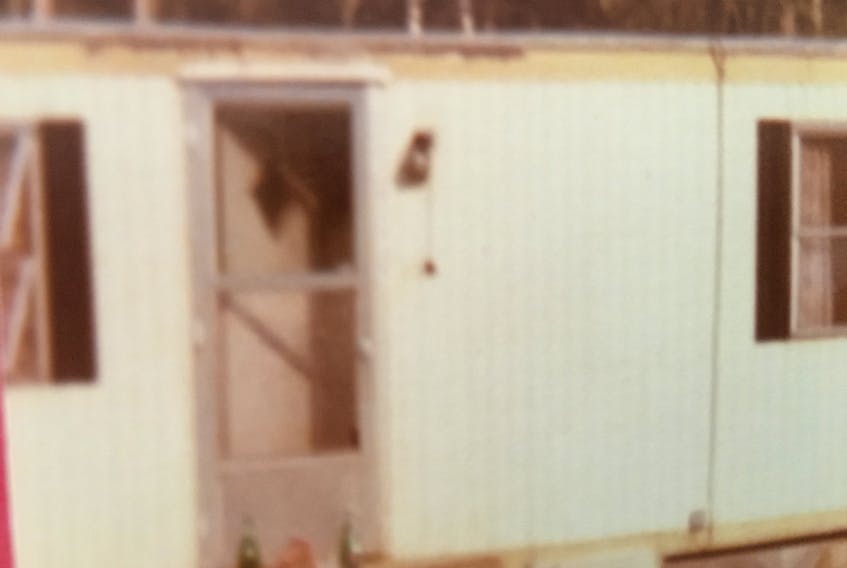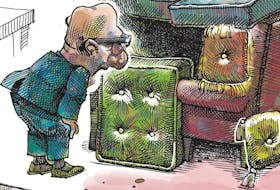I am trailer trash.
In St. John’s, there aren’t that many trailers. So, I guess if I had grown up here, some might say I was a skeet from Skeetsville.
It's a term that — while no doubt having its origins in describing a criminal element — often is used when simply referring to poor people and, sadly, those living in social housing or low-income neighbourhoods.

I grew up in Nova Scotia, mostly in a trailer — in a single-parent, fixed-family-income household.
Before that we lived in houses way back in the country — go out to the sticks, turn left and drive another 30 minutes.
Related story:
Newfoundland and Labrador Housing policy on trampolines, pools, fire pits spoils summer fun, St. John’s tenant says
The last was a farmhouse in West River Station, way off the highway about an hour, hour and a half this side of Halifax. Rent was cheap — this is my childhood memory of it — because my carpenter father was able to do repairs to the drafty old house, which was heated by an ancient coal burner. This may be the place where my intense rodent phobia was born.
It was the late 1960s/early 1970s and we had no indoor plumbing, just an outhouse. That’s the kind of thing you don’t tell many people because most people had bathrooms back then.
We didn’t have a phone, so the day my father died — I was seven — the neighbours came to tell us he had passed away in the Camp Hill Hospital in Halifax. I remember it was before school and I cried into a rare breakfast of egg (as opposed to the usual lumpy porridge I could never stomach and which I would sit stubbornly in front of as it grew colder and colder; puffed wheat was a luxury). I’m not sure who else cried. My father drank a lot of whatever his earnings were, and he was a harsh man, but as the youngest and only girl, my memory differs some.
After that we moved to another community on the other side of the county — my mother bought a trailer and a bit of land, and we lived on my father’s veterans’ benefits.
From then on, I remember a struggle in school as I slipped further into the pool of kids many teachers would give up on, just based on their backgrounds. I hated going to school and would stay home as much as I could.
In junior high, I actually had a teacher tell me I wasn’t worth anything because of where I came from — there were no graduates with my surname.
But I graduated, went to university, paid back a student loan with high double-digit interest rates and built a career that took me all the way to Washington, D.C., before I settled back to Atlantic Canada, and has won me respect and a slew of awards, albeit no riches.
Why am I telling you this?
Because too often I hear people speak of certain neighbourhoods with disdain, as if every poor person who lives in them is a criminal, or lazy, and if they are there on the taxpayers’ dime, they deserve no extra comforts.
"Even as I typed the first paragraph, I knew once it hit our Telegram Facebook page an all-out class war would erupt. And it did. Two hundred comments and counting."
I have heard people say they would not set foot on a Metrobus because only poor people — the skeets — take the bus.
I have heard people describe certain schools as having too many low-income students for their little middle-income Jackson or Emma.
I have heard store managers explain away heavy security as the fault of an entire neighbourhood — as if everyone who lives there is light-fingered.
And so when I wrote a story in Wednesday’s Telegram about a woman living in social housing who spoke up about not being allowed pools, fire pits or trampolines in her backyard, I listened to her concerns. I could also see the point of the Newfoundland and Labrador Housing Corp., which implemented the policy based on liability issues.
Even as I typed the first paragraph, I knew once it hit our Telegram Facebook page an all-out class war would erupt. And it did. Two hundred comments and counting.
Here’s a sample:
“Maybe if she can afford fences, pools and trampolines she can afford her own house or apartment. Then she can put what she wants in her garden!! Most people living in these low-income houses have it better than most of the working people!!”
“Taxpayers care. If she paid for this herself, it’s because her rent is subsidized, by taxpayers,” wrote another.
“First of all there are lots of ways to get amenities without spending all the money in the world, like gifts, and buying used. Second, she’s spending it on her kids. With so many people spending money on drugs and alcohol and cigarettes I’m totally fine with her spending tax money on her kids,” said someone with a middle-of-the-road view.
“Just saying it don’t seem like responsible spending from a person living in low income,” was a rebuttal.
I’m not speaking for anyone other than myself. Nor am I making any assumptions about other people’s backgrounds or reasons for living in social housing, so nothing I say should be equated to the subject of the news story. I am writing this because of some of the reaction.
I have heard this argument a lot. It often devolves into someone insisting that if you are poor, you can damn well get yourself out of it and there’s no excuse if you don’t.
It’s not as easy as you think to “get off your arse” and move out of social housing, haul yourself out of poverty or out of a low-income situation, wherever you may be.
From my perspective, having dealt with a lot of different people over the years, some of it has to do with life skills.
If you are lucky enough to have grown up with two loving, encouraging parents, how would your life be different? What if you didn’t even have one — not that the one is a bad person for not being encouraging, but perhaps they just didn’t know how?
How would your life be different if hardly anyone expected anything of you and some told you quite clearly that you had nothing to offer?
"For all my childhood, I wondered what it would be like to live in a real house."
Sometimes I imagine what would have happened if I had continued to listen to that junior high teacher, and not walked into a different classroom one day to place a Scholastic book order and found someone who actually encouraged my choices above my grade level.
Perhaps I never would have put myself on a path toward wonderful teachers and classmates in senior high, and never would have felt I could have something more.
For all my childhood, I wondered what it would be like to live in a real house.
I do now and it’s nothing fancy.
And I live in a neighbourhood with a large block of social housing.
There are professionals, tradespeople, seniors and young people starting out.
Sometimes in the summer it gets a bit congested, and too noisy.
But we’re not running around in bulletproof vests fearing for our lives, as some would have it.
There are some you could legitimately call skeets, I am sure, as there are in any neighbourhood, but there are a lot of wonderful people just trying to get along — whether they live in social housing, or own their properties.
Lately, it’s also become culturally diverse, and I like that.
Every now and again I watch the “Trailer Park Boys,” and a lot of the humour makes me cringe. (My mother did not drink and we weren’t involved in crime as the boys were, and we did not live in a trailer park.)
But there’s a part of me that will always identify with that trailer trash crowd. And I’m fine with that.
Twitter: BarbSweetTweets









